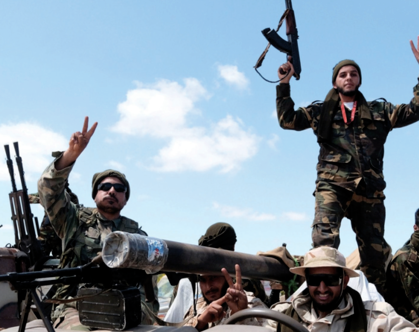The United Nations Security Council has passed a resolution backing the outcomes of last month’s Berlin Conference on Libya despite the abstention of Russia.
The text endorses the conference conclusions and welcomes the establishment of a Joint Military Commission from both Libyan factions that could agree a permanent ceasefire and open up the space for a much needed political process.
It backs calls made in Berlin that all parties, internal and external, abide by an arms embargo established in 2011 and warned that those threatening the stability, peace and security of Libya could face sanctions.
14 votes in favour and one abstention from Russia – but unlike a veto, that doesn’t change the result. Moscow complaining that the process to get the resolution adopted was rushed… more than three weeks post Berlin.
Russian Ambassador , Vassily Nebenzia says: “We still don’t have a clear understanding on whether all the Libyan sides are ready to implement that decision although they often stress the importance of this step at the preparatory phase of the Berlin forum and after it’s conclusion and this was specifically demanded by the Libyan crisis which was the result of blatant violation of Security council resolutions in 2011.”
But the lead pen holder on the text welcomed its passage, the UK’s Ambassador Karen Pierce.
“I think the language is very clear and I think the will of the council is very clear, they want to see a ceasefire coming out of the joint military commission in Geneva and then they want that to be monitored and the other operations tasks agreed at Berlin to be taken forward so its absolutely implementable but it will be down to the parties on the ground and their foreign backers as to whether or not it gets implemented. So to the Russians and the others who have very close interests in Libya, I would think the remedy was in their hands.”
The resolution fully supports the mediation efforts of the UN Mission to Libya, condemns the recent blockade of oil facilities, and calls on all member states to cease and withdraw support for armed mercenaries operating in the country.
South Africa warned that the road ahead would be difficult.
Pretoria’s envoy, Jerry Matjila says: “It’s very important for the Council to understand the AU and the neighbouring countries in Libya have to be consulted and have a say and this was achieved.” referring to friction between the African Union and the Arab League about which organisation should take the lead on Libya.
The Libyan envoy from the UN-backed Government in Tripoli had this message for those countries supporting the faction of General Khalifa Haftar who has led the ten-month offensive against his government.
Ambassador, Taher el-Sonni says: “They should really change their method, they should look at Libya and Libyans not only oil, migration and counter-terrorism. Supporting a dictatorship will not lead to anything. He promised them 48 hours to conquer Tripoli, we’re now ten months and he cannot and he will not be able to do that. He’s the reason for the chaos in the area and in the region so I think if you want to support democracy, it goes without saying that supporting a dictatorship or military figure is not the way forward.”
UN Chief Antonio Guterres earlier called the situation in Libya, particularly the violation of the arms embargo by member states, a scandal.


